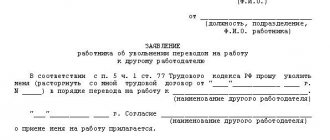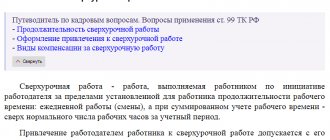Author of the article: Lina Smirnova Last modified: January 2021 16401
Sometimes employees are faced with circumstances where they are forced to perform duties that are different from their previous work functions, regardless of their wishes. If such a transfer to another position without the employee’s consent is carried out by the manager in violation of the laws, it can lead to his punishment in the form of fines and even legal liability.
Let's consider what is meant by transfer in the Labor Code of the Russian Federation, what types there are, in what situations the transfer is carried out legally, and when it is a violation of the employee’s labor rights.
When is a transfer possible without consent?
The legislator determined whether an employer can transfer an employee to another job without his consent and under what conditions. The answer is given in parts 2, 3 of Art. 72.2 of the Labor Code of the Russian Federation, which include an exhaustive list of cases. The procedure without consent is carried out under strictly defined conditions by the legislator. This list is final, that is, it cannot be supplemented by:
- natural, man-made disaster;
- industrial accident;
- accident;
- emergency situations in the form of fires, floods, earthquakes, epidemics;
- situations that threaten life or its normal conditions and concern the entire population or part of it.
Cases when an employee is transferred for production reasons without the latter’s consent:
- simple;
- preventing loss or damage to property;
- replacing another employee who is temporarily absent.
These options are exercised when they occur due to an emergency.
In any case, the transfer of an employee under the Labor Code of the Russian Federation, carried out without the consent of the person, to work under conditions not included in the employment agreement, is possible with the same employer for a period of no more than 1 month. Its goals should be:
- the need to prevent emergencies;
- eliminate the consequences that have occurred.
The employer should understand that the need to organize adjustments without the consent of the employee arises, for example, due to equipment breakdown, delays in delivery of materials, etc. That is, it is not related to emergency circumstances and is implemented only through an agreement between the employer and the employee. The latter cannot be attracted against his will. It should also be borne in mind that transfer to a job requiring lower qualifications is permitted only with the written consent of the employee.
If an employee in difficult circumstances does not want to agree to new conditions, his behavior falls under the definition of “disciplinary offense”, and absence from work is considered as absenteeism. But there is an exception to this rule. A subordinate will not be punished if he does not perform such work in conditions that are dangerous to his life or health. Hazardous conditions in this case are those that arose due to violations of labor safety standards.
The possible number of employee transfers during the year has not been established, since in such conditions emergency work is performed.
To another position
A transfer to another position can be initiated either by the employee himself or at the suggestion of management. Human consent is a fundamentally important condition . The reasons may be:
- adjustment of staffing;
- acquisition by an employee of another specialty, higher qualifications (for example, completion of studies);
- the opportunity to occupy a vacant position of a higher rank, etc.
If this is a transfer on a permanent basis, then the head of the unit where the transfer is planned must contact the administration with a report or memo with a specific request.
himself must write a statement , after which the management has signed it, the personnel inspector will prepare an order for the transfer.
Since the terms of the main employment contract change, additional ones are needed. agreement.
Often the personnel officer is at a loss: what basis should be indicated when drawing up personnel accounting documents? The only correct answer is to refer to additional information. agreement to the employment contract on transfer.
If it is proposed to transfer to a unit that is geographically located in a completely different area, such changes affect not only the interests of the worker himself , but also all members of his social unit.
Such a procedure is more serious both in terms of validity, documentation, and material payments.
In the case where the employee has to work in a new place for some time, his consent is also mandatory.
Highly qualified workers should not be offered jobs that do not require special training and experience; this is contrary to the law and is considered unacceptable.
the duration must be indicated .
Upon expiration of the period, the employee begins, from the date following the end date mentioned in the order, to perform his official duties in the previous position that he previously held. Temporary transfers are not reflected in personnel records and work books .
If the organization does not work due to downtime , in agreement with the employee, he can be other activities temporarily ) at the same enterprise for the entire period of downtime , or in the same locality in another organization , only the period in this case is provided for up to 1 month .
If an employee has suffered from an illness and has a document stating that he is unable to work as before until recovery, then the administration should try to find a more gentle option .
A transfer to another position, even with a higher income level, without a positive response from the person.
The employee’s consent is not needed if he is transferred from the same owner to another place, work, or division, which is located in the same locality, and the terms of the employment contract have not changed .
What about the salary?
Since this process is forced, there are payment guarantees established by the legislator. Payment occurs in 2 options:
- If the salary for the new position is higher than the average for the previous one, the employer pays the salary for the work that is being performed. In fact, this is the average salary for the previously held position and additional payment.
- If the payment under the new option is lower than the average for previously performed work, you must pay in the amount of the previously paid average salary. Moreover, the manager, if desired, additionally motivates employees financially.
By necessity
- Justification of production necessity.
- If the employee plans to return to work after the recall, then this date must be indicated; if he plans to take further rest, then indicate the duration of the recall.
- In case of unfinished vacation, the method of using the remaining days is indicated.
- Data on recalculation of vacation pay and wages.
Please note => Conversion from preferential service according to list 1
Art. 99 of the Labor Code of the Russian Federation stipulates that the employer can take the initiative to leave a worker at work beyond the duration of his working hours if it is necessary to finish work already started. Moreover, these should not just be working moments, but if, as a result of an unfinished work process, conditions may arise that lead to damage and destruction of production property, as well as conditions that can lead to the loss of human life or health.
Temporary
The duration of a temporary appointment to another position is:
- up to 1 month (term of transfer without consent in case of emergency);
- up to 4 months (for health reasons);
- up to 1 year;
- another period, including more than a year, if the appointment was made to replace a person who is absent, but by law his place is retained until his departure.
The legislator in Art. 72.2 of the Labor Code of the Russian Federation establishes in what cases it is possible to transfer an employee to another job without his consent, types of temporary appointments (for a certain period while maintaining the main place). These are the options:
- by agreement of the parties (Part 1 of Article 72 of the Labor Code of the Russian Federation, written form, up to 1 year);
- transfer of an employee to another position without consent in emergencies, disasters, downtime (parts 2, 3 of article 72.2 of the Labor Code of the Russian Federation, up to 1 month);
- to perform the duties of an absent (temporarily) employee (written agreement, before the main one leaves);
- pregnancy and caring for a child up to one and a half years old (during pregnancy - a doctor’s opinion, providing for easier working conditions, due to the need for normal feeding);
- health status. If there is a medical certificate, transfer of an employee for a period of up to 4 months without his consent for health reasons is impossible. If the employee has written consent, the employer provides other work indicated for health reasons. If a subordinate refuses to transfer or the employer does not have a suitable job, the person must be removed from work, retaining his place;
- transfer to another position due to suspension of work.
What types of transfers are there?
There are several types of employee transfers. Let's take a closer look at each type.
Interior
During an internal transfer, an employee’s job functions change within the company. In fact, an employee occupying a certain position is transferred to another position.
That is, his profession changes, but his employer remains the same. If an employee is transferred to another branch, then such a transfer is still considered internal, even if the new unit is located in a different area.
External
An external transfer is considered to be a change in job functions or place of work associated with a change of employer. During an external transfer, an employee may not only change his or her work activity, but also change his employer.
Temporary
If a change in an employee’s job functions occurs temporarily, then the transfer is considered temporary. It is often used when a production need arises to complete assigned tasks.
For example, the main employee got sick or went on vacation, the manager does not want to hire a new employee. He offers one employee to switch to the job of the departed employee for a given time.
Constant
If changes in the employee’s job functions or place of work are permanent, then the transfer is considered permanent. They can be carried out by changing the functions or position of an employee with one employer, by transferring the employee to another locality together with a given company, or by transferring to another company.
Important! For a permanent transfer, it is necessary to obtain the employee's prior consent.
For a lower paid job
This translation assumes that the employee undergoes a change not only in his job functions or place of work, but also at the same time his remuneration for work is reduced. This transfer must be carried out only with the consent of the employee.
This situation often arises when a job is being reduced and the employer offers the employee who is about to be laid off the vacancies he has, including those with a reduced salary. Transfers to lower-paid positions also include transfers due to health reasons.
Constant
A permanent transfer of an employee without his consent is impossible. This type is associated with a change in the actual place of performance of functionality, salary, and powers. Occurs when:
- the wishes of both parties;
- written contract.
For a temporary appointment to become permanent, the following conditions must be met:
- the transfer period has expired;
- the employee’s previous position was not provided;
- the employee did not demand his previous position;
- the employee continues to work.
With the simultaneous implementation of these conditions, the transition to another position loses its temporary nature and becomes permanent. Now the employer does not have the right to transfer an employee to his previous job without obtaining his consent.
ConsultantPlus experts examined whether it is possible to transfer an employee to another position corresponding to his qualifications due to the epidemiological situation due to coronavirus, and if he refuses, to fire him. Use these instructions for free.
to read.
Transfer of an employee due to production needs, without the employee’s consent
In the event that, for reasons related to changes in organizational or technological working conditions (changes in equipment and production technology, structural reorganization of production, other reasons), the terms of the employment contract determined by the parties cannot be preserved, they may be changed at the initiative of the employer, with the exception of changes in the employee’s labor function. Thus, you need to be 100% sure that another vacancy for this position is not filled by anyone (there are staff positions) before refusing. And have evidence of this on hand, so that you can then challenge the employer’s decision to dismiss (which can happen, as follows from the above rules).
For a lower paid job
Appointment to a job that is paid lower is possible only as a transfer at the initiative of the employee, that is, with the written consent of the employee. The reason is the inconsistency of the level of knowledge and skills with the established requirements, that is, the inadequacy of the position held due to insufficient qualifications, which is confirmed by the results of certification. In this case, the employer records a discrepancy with the qualification requirements and offers to transfer to a lower-paid position. If this option is refused, the employee will be fired.
Customer Reviews
Thanks to Stepanov D.Yu. I express my deep gratitude to lawyer Denis Yuryevich Stepanov for his high professionalism and attentiveness to his case when considering the issue in word with a contractor who improperly completed the work of erecting a screw foundation. The cost of the work amounted to 178,300 rubles. And the court of the Vyborg district (Case No. 2-1432/2018) dated March 12, 2018) to collect, taking into account all fines, 504,800 rubles. Once again, I thank you and wish you success in your future work and only successful business conduct.
Grateful to you, your client. 05/18/18
Gratitude to Solovyov I would like to express my deepest gratitude and appreciation to Konstantin Vasilievich Solovyov for his attentive attitude and very competent consultation. And if I ever need legal support, I will definitely turn to him. I would also like to mention Daria Valentinovna Kutuzova, who greeted me with a smile and answered some of my questions. I wish the company success, further prosperity, and more clients.
Gratitude from gr. Kolesnikova A.N. Let me express my deep gratitude to the Legal Agency of St. Petersburg, located at Spassky Lane, 12. For their professional and friendly assistance in resolving my issue! I wish to continue working, bringing benefit to all residents of St. Petersburg. And not only.
Kolesnikov Alexander Nikolaevich.
Position: Head of the Metro Implementation Sector
PS: Before your company, I contacted 5 companies on this issue and received unclear answers.
Gratitude I express my deep gratitude to lawyer Konstantin Vasilyevich for his attentive, kind, and, most importantly, very clear and competent explanation of my situation. It's nice to know that the world is not without good people. I wish Konstantin Vasilyevich good health, success in everything, prosperity, good, grateful clients and all the best. Sincerely.
Feedback from Solovyova I would like to express my deep gratitude to lawyer Konstantin Vasilyevich Solovyov for his qualified assistance in resolving my issue. The decision was made in my favor, for which I am very grateful. I would also like to express my gratitude to the company’s team for their sensitive attitude towards clients.
Gratitude from P.V. Greshina I would like to express my deep gratitude to the employees of your company - Sergei Vyacheslavovich Mavrichev and Konstantin Vasilyevich Solovyov for their enormous support, for their competent explanation and good attitude towards people. I wish you success and prosperity.
Greshina P.V. 03/23/2018
Gratitude from Volkova N.E. I express my gratitude to Vasily Anatolyevich for his professional and competent assistance in resolving the issue of protecting my consumer rights. As a result, I received decent compensation from. Thank you!
Volkova N.E. November 30, 2018
Gratitude from Loseva S.I. I express my deep gratitude to Sergei Vyacheslavovich (lawyer of the firm) for his very clear, accessible help in solving my problem (protecting rights as a consumer). This is the second time I have contacted you to solve my problems. Always everything......and in full.
With gratitude, Svetlana Ivanovna Loseva, 02/15/2019
Gratitude from Tunnova L. Sergey Vyacheslavovich! Thank you for the qualified advice you provided regarding my question in the field of consumer protection (dispute with TC OPT, the kitchen was not delivered)
Lyubov Tunnova December 12, 2018
Review by Marcheilo I.V. On September 24, 2021, I turned to Konstantin Vasilievich for legal advice. I would like to express my gratitude for your sensitive, attentive attitude and qualified assistance. I received a comprehensive answer to all my questions. They helped a lot. Thank you! Sincerely, Marcheilo Irina Vladimirovna.
Procedure for transferring without consent
If it is necessary to transfer an employee to another job forcibly, step-by-step instructions for transferring an employee to another position without his consent look like this:
Step 1. Issue an order in form T-5 (T-5a), indicating the reasons and grounds for the appointment, its start and end dates.
Step 2. Attach other documents justifying it to the administrative document (in their absence, the employee has the right to refuse).
Step 3. Do not make an entry in the labor record (Article 66 of the Labor Code of the Russian Federation, temporary replacements are not recorded).
Step 4. Keep the order for at least 50 years.
IMPORTANT!
It will be useful: how to transfer an employee to another position through dismissal.
What to do if an employee refuses a transfer?
Due to change in work schedule
The enterprise may need to transfer an employee to a different work schedule than he worked before. The law establishes that the administration is obliged to warn the employee about this event no later than 2 months before the date of entry into force of the changes.
The employee may not agree with the new working conditions. In this case, he must be offered all available vacancies at the plant. In a situation where an employee refuses all offers or management has nothing to offer him, he can be dismissed unilaterally at the initiative of the employer.
From moving to another area (branch)
An employer can change its legal address and move to another location. All employees must be notified 2 months prior to the event.
At the same time, the law establishes that the administration must compensate for the following costs:
- Relocation of an employee and his family members to a new place;
- Transportation of property to a new place of work;
- Arrangement at a new place of residence.
You might be interested in:
Hiring an employee for the main job: detailed step-by-step instructions
The employee is sent a written communication and must also express his decision in writing within a certain period.
Attention! If a statement of consent is not received within the specified period, this is considered a refusal. In this case, the employer formalizes the dismissal unilaterally.
How to dispute
An employee who has been assigned to another position with violations has the right to challenge this in the following ways:
- send a complaint to the labor inspectorate;
- contact the labor dispute commission in the organization;
- file a lawsuit.
The Plenum of the RF Armed Forces explains: the employer proves the validity of applying Parts 2, 3 of Art. 72.2 of the Labor Code of the Russian Federation, used for the forced appointment of an employee in certain circumstances. This means that when preparing such a transfer, the employer should strictly adhere to the provisions established by the legislator.
Transfer due to production needs without the employee’s consent
The candidate’s reluctance to comply with the director’s order must be documented in writing, with approximately the following wording: “Please do not transfer me to work in the poultry house, since they use the chlorine-containing compound “Chloramine” for disinfection and this will harm my health. I have a persistent allergy to chlorine-containing drugs, which is confirmed by a certificate from an allergist. Sincerely, Nikiforova Maria Ivanovna (signature) September 23, 2021.” The director puts the visa “I don’t object” and appoints another candidate. A distinction should be made between moving to a new employer and moving to another locality or division. In the first case, consent is not needed only in emergency situations. If we are talking about moving to another branch, for example from the central to the regional, then Art. 72 of the Labor Code of the Russian Federation, which means that the company does not have the right to make such a decision alone. You can refuse, but this in turn will entail a break in cooperation, again by agreement of the parties. (Article 77 of the Labor Code of the Russian Federation)
Transfer due to production needs without the employee’s consent
If the employee accepts the new terms, put this in writing. Confirmation of consent can be the employee’s application for transfer, as well as the employee’s handwritten signature on the transfer order: “I agree with the transfer.” If, after two months, the employee declares that he is not satisfied with the new position, the employer has the right to dismiss him under paragraph 7 of Article 77 of the Labor Code (the employee’s refusal to continue working due to a change in the essential terms of the employment contract). Upon dismissal, in addition to compensation for unused vacation, the employee will have to pay severance pay (Article 73, paragraph 2 of Article 81 of the Labor Code).
- to prevent a catastrophe, industrial accident or eliminate the consequences of a catastrophe, accident or natural disaster;
- to prevent accidents, downtime (temporary suspension of work for reasons of economic, technological, technical or organizational nature), destruction or damage to property;
- to replace an absent employee.
What you need to know about translations
According to the Labor Code of the Russian Federation, transfer to another job is:
- permanent or temporary change in the employee’s labor function (position in accordance with the staffing table, profession, specialty indicating qualifications; specific type of assigned work),
- change in the structural unit in which the employee works (if the structural unit was specified in the employment contract),
- moving to work in another area with the employer.
As a general rule, both before transferring an employee to another permanent job and during a temporary transfer, it is necessary to obtain the written consent of the employee. The presence or absence of consent to the transfer is a mandatory condition for the legality of the employer’s actions, which is subject to verification by the court in the event of a labor dispute.
Challenging an illegal transfer
If the employee is sure that the management made the transfer without his consent, that is, the terms of the employment agreement change, he can challenge the employer’s actions. Please contact:
- to the labor inspectorate;
- to the prosecutor's office;
- to court.
To appeal a transfer through the labor inspectorate or the prosecutor's office, you need to draw up a complaint, which outlines the essence of the problem. The authorized body will conduct an inspection at the enterprise. If violations are discovered, the employer will be fined and the employee will be returned to his previous position.
To protect your rights through the court, you need to draw up an application. The filing period is 3 months from the date of violation of rights. The employer will be fined.
Legal grounds for dismissal
The grounds for termination of a contract are described in detail in Article 77 of the Labor Code of the Russian Federation, since the legislator strives to provide for and regulate as much as possible each of the possible options that the parties can choose. The following can be identified as legitimate reasons for terminating an employment relationship:
- at the initiative of the employee (Article 80);
- at the initiative of the employer (Article 71 and Article 81);
- agreement of the parties. That is, the contract can be terminated at any time and on any conditions determined by the parties in a special agreement (Article 78 of the Labor Code of the Russian Federation and Resolution of the Plenum of the Armed Forces of the Russian Federation dated March 17, 2004 No. 2);
- expiration of the contract (Article 79);
- transfer to another employer;
- refusal of an employee to work after a change of owner or jurisdiction of the organization (Article 75);
- employee’s refusal to work after changing the terms of the contract (Article 74);
- refusal of an employee to transfer to another position due to medical indicators that were identified during a periodic medical examination (Article 73);
- the employee’s disagreement to move with the employer (Article 72.1);
- circumstances beyond the control of the parties (for example, conscription into the army or a natural disaster, all listed in Article 83 of the Labor Code of the Russian Federation);
- concluding an agreement in violation of current legislation (Article 84);
- other grounds provided for by current legislation.
As for the legal basis for a transfer, Article 72.1 of the Labor Code of the Russian Federation gives an unequivocal answer: an employee can be transferred to another job, to another department, to another location only with his written consent, if this entails a change in the terms of the employment contract.
Regardless of what was the reason for terminating the contract, the employer needs to approach the registration of dismissal as responsibly as possible, so that in the future there will be no problems with the labor inspectorate or court.
The dismissal or transfer of an employee is regarded by the court as unlawful if:
- the procedure for termination of employment relations or transfer provided by law has been violated;
- the basis does not correspond to the list given in the Labor Code of the Russian Federation.
What to do! If you are transferred to another job without your consent
How can an employee find out whether the employer actually has a so-called production need? So, production necessity is recognized for a given employer as the need to prevent a catastrophe, an industrial accident or to immediately eliminate their consequences or the consequences of a natural disaster, to prevent accidents, downtime, destruction or damage to the employer’s property or other property, the need to replace an absent employee and other exceptional cases. Judicial practice classifies as exceptional cases the need to perform urgent work that was not foreseen in advance by the employer, on the timely completion of which the future normal operation of the organization as a whole or of a separate workshop, department, or site depends. Normal production needs, as well as improper organization of the production process, cannot serve as a basis for such transfers. Temporary transfer in case of downtime (Article 34 of the Labor Code) is the second case of transfer to another job without the employee’s consent. Refusal to make such a transfer is a violation of labor discipline, for which the employer has the right to impose a disciplinary sanction. Downtime is a temporary, for a period of no more than six months, absence of work due to a production or economic nature (failure of equipment, mechanisms, lack of raw materials, materials, electricity). Transfer to another job due to downtime is carried out in order to provide the employee with work. In case of downtime, the transfer period is determined not by any calendar period, but by the duration of the downtime. The employee is transferred to another job with his employer for the entire period of downtime, and to another employer, but in the same area - for a period of up to one month.
21 Dec 2021 marketur 162
Share this post
- Related Posts
- Compensation for the cost of providing utility services to preferential categories of northerners, Arkhangelsk region
- Sample of a fixed-term employment contract by agreement of the parties
- Deadline for applying to court for a labor dispute
- Codes for time sheets 2019







